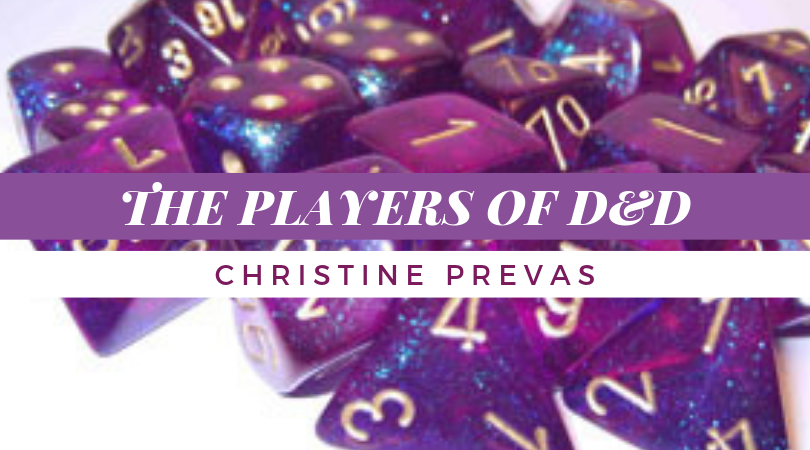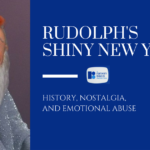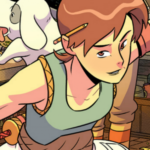
Welcome to another edition of The Players of D&D, where we interview women and gender non-binary persons who love to play D&D! We talk about their personal experiences with the game, the challenges they faced, and how they found their D&D community.
This week, we check in with Christine Prevas!
Rogues Portal (RP): What is your background or history with the game?
Christine Prevas (CP): In addition to being a DM for a few groups of friends, I am also a public librarian running Dungeons & Dragons programming for teenagers in my public library, and advocating for support for tabletop roleplaying games as an educational and social tool for teens.

RP: What do you like about playing DnD?
CP: My favorite part of D&D is the collaborative aspect — I’ve always loved telling stories, but I find my stories are at their best when they’re not just mine. The surprise that comes from everyone having their own hand on what’s happening and their own influence and agendas, the messiness that comes from never quite knowing where things might go. I love being able to give up control over what’s going to happen and leave things both up to the other people at the table, and up to fate, and seeing what rich and exciting and unexpected things happen.
RP: How long have you been playing?
CP: I first played D&D about seven years ago, while I was in college, with a group online. When that game ended, I stopped playing for a while, until about two years ago when I started playing regularly again. I’ve been playing D&D or a variety of other tabletop roleplaying games — Monster of the Week, Scum & Villainy, and a handful of GM-less games — at least once a week ever since.
RP: Favourite type of characters to play?
CP: I love to play gruff loners who have to struggle to come to trust the people they’re traveling with. I think all of my best characters have been some variation on that form — rangers, assassins, troubled warlocks — when I started playing I wasn’t the best at improvisation, and so playing characters that didn’t speak much gave me space to really think about what I wanted to say, and the habit kind of stuck. On the opposite end of the spectrum, I also love charismatic fools who have no idea what they’re doing and accidentally get everyone else into trouble — any character that you could theoretically describe as “a complete disaster” or “working against their own best interest” is completely up my alley.
As a DM, I love playing NPCs that are really wild — rambling academics with poor social skills have become my absolute favorite type of NPC to put into a campaign. And children, too — there’s something, so fun about watching a bunch of adventurers try to deal with a strong-willed 9-year-old trying to go in the opposite direction of where she’s supposed to.
RP: What are some challenges you face as a woman, trans person, non-binary person playing DnD?
CP: The first time I played D&D was with a group online, which was run by a friend of mine, and while I was friends with two of the people in the group, there was one guy I didn’t know. In what I think is probably a pretty typical experience, this one guy ended up making me pretty uncomfortable week after week: oversexualizing my intentionally not-sexy character, talking down to me when I didn’t understand the rules, speaking over me.
Once I started playing primarily with people I already trusted, that wasn’t so much an issue — but since coming out as nonbinary, I’ve definitely experienced some of the same struggles I do in my everyday life, with players accidentally misgendering nonbinary characters. And I feel somewhat limited to only playing with people I already know in advance that I can trust to not be transphobic.
Unexpectedly coming across the sex-and-alignment-change room in the Tomb of Annihilation module when it was re-released for 5e was startling as well. I wasn’t playing the module at the time, just reading it, but I can’t imagine what it would have been like to be a player going through that adventure and either being forced myself into an uncomfortable position or being faced with the kinds of transphobic jokes that sex-change tropes often provoke.
RP: Were there any fears or hesitations or other things you might have had that stopped you from playing or kept you away?
CP: The negative experience I had playing D&D in college — which, again, was one single experience in a campaign full of fun stuff — was enough to keep me away from D&D for a good few years. Because my close friends didn’t have the time or interest to play, if I wanted to continue I’d have to either find groups online or, say, go to my local comic shop’s game system, As someone who was in the process of coming to identify as nonbinary, and who was seen as a woman, I was absolutely uncomfortable with the idea of walking into a group of strangers and trusting them not to treat my unfairly.
Had I not been given the opportunity to play with a group of people I trusted — and found the confidence to run a game myself, where I’d have a slightly higher degree of control in terms of what came up at the table — I might not have returned to the game at all.
RP: What are some steps that need be taken to make it more inclusive?
CP: I think the most important step is for Wizards of the Coast to actively seek out and hire diverse game designers — designers of color, and queer and trans designers — to work on the game, or at least as consultants and sensitivity readers. While marginalized communities have very much taken the game and made it their own by doing independent work at the table to suit the game to their needs, Wizards of the Coast’s actual efforts to increase diversity, especially with regards to gender identity, in their published materials is often lip service at best.
Recently published sourcebooks exoticizing trans people, the conflation of sex and gender in the game’s attempt to clumsily canonize genderfluid elves, and, as I mentioned earlier, the lack of foresight to update modules like Tomb of Annihilation to remove harmful tropes are actively, if not intentionally, working against the effort that people are making at the table to make their spaces more inclusive. Having people who are affected by issues like these actively working to make the game more inclusive is the only way to ensure that the work being done on D&D isn’t a step backwards for the little that has already been done to update a game that originates in a kind of fantasy that is historically steeped in racism, colonialism, orientalism, and imperialism, designed by and for straight white men who don’t want people unlike them in their space except, perhaps, as an “exotic” window-dressing.
RP: What do you love about the game?
CP: Running the game for teenagers at work has really given me a different outlook on what I love about the game. It’s not just having fun with friends, rolling dice, and getting to be someone else fantastic for a little while — it’s the ability to set aside time to tell the story I want to see. As a permanently exhausted and overworked millennial I don’t always have the energy for social time, but every week’s session of D&D leaves me energized and excited about the game, as well as socially re-charged at the end of the week.
Past that, I love seeing the faces of the teens I work with light up when they have a brilliant plan, or when they roll a natural 20. I love seeing them work together to get through things, and seeing their hard work pay off when they finally accomplish what they wanted to do. I love seeing them get excited when they ask “Can I make my character—” whatever they want to be, and I can tell them yes. I love the realm of possibility it opens up for them, and I love everything I’m learning from them when we play.
RP: What are some things you want people to know about the game?
CP: As someone who started out in D&D and has since broadened my horizon into the huge scope of other games that are out there — Powered by the Apocalypse games, Forged in the Dark games, and a wealth of other incredible indie rpgs — the biggest thing I want people to know is that if D&D isn’t suiting the story you want to tell, there’s probably a different game that does!
People often say that D&D can tell whatever story you want it to, but the truth is that it can’t. Tabletop roleplaying games can tell whatever story you want to, but specific systems are designed to tell specific kinds of stories. D&D’s rule set, its character creation, its combat system, and its experience and reward systems are built for a specific kind of play — high fantasy games about adventurers killing monsters and stealing loot. Lots of people tell other stories with D&D, defaulting to it because it’s the most popular, but that doesn’t mean that it’s the best system for what you’re doing. You can play a heist in D&D, but you can also find a system like Blades in the Dark that’s built to play fantasy heists. You can care deeply about the interpersonal relationships of the party members in D&D, but you can also play in a system that mechanically centers those relationships and connects character development and experience directly to working on those interpersonal relationships, like Dungeon World.
I think D&D is a great system. I think it’s fun, I have a blast playing it, and there’s very little more satisfying than rolling a d20 in front of all of your friends. But it’s also a game still attached to its history as a war game, with themes deeply rooted in colonialism, and deserves a lot of the deep, critical thematic untangling that people — especially people of color — in the rpg community are doing. Any game can be made to be inclusive by the people running it at the table, but in D&D it takes a lot of legwork to handwave the racism built into the game by its legacy, and there are tons of games out there that are built to be inclusive by design, so I highly encourage people to give some a try.
RP: How would you encourage people to get into the game or how to start playing?
CP: The biggest hurdle for me in getting into D&D was not having the money to buy the books, so if that’s the case my advice is: check your public library! The system I work in has dozens of copies of the Player’s Handbook, the Dungeon Master’s Guide, and essentially every official pre-written campaign Wizards of the Coast has published, all for free.
If the rules are the main barrier in getting into the game, I recommend YouTube, which is filled with videos that explain the basics of the game. Listening to podcasts or watching streams of other people playing was a huge help to me in getting into 5th Edition after such a long break since I’d played 4th edition.
You don’t have to have every rule exactly right the first few times you play: you can add rules in and make them more complicated as the game advances and you and your friends become more familiar with how the game works. When I started playing with the teenagers at work, even though I knew the rules, I introduced rules slowly as we progressed through our adventure, adding in complications as they started to get the hang of the original rules. And those early sessions were just as fun as the later ones, without needed to take several hours to explain every detail of the rules. There’s no wrong way to play, as long as everyone is having fun.
If you are someone who identifies as a non-cis male and would like to be interviewed for The Players of D&D, please reach out to andrew@roguesportal.com.




One thought on “The Players of D&D – Christine Prevas”